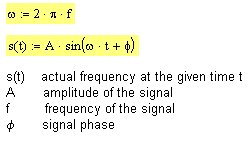Phase: Difference between revisions
m (+cat) |
|||
| Line 17: | Line 17: | ||
Note: the phase can be either expressed as +/-Pi or +/-180deg. The signal itself can be described as cosine or sine, both is equivalent and up to you depending where you define the time t = 0. |
Note: the phase can be either expressed as +/-Pi or +/-180deg. The signal itself can be described as cosine or sine, both is equivalent and up to you depending where you define the time t = 0. |
||
[[Category:Technology]] |
|||
Latest revision as of 22:29, 2 April 2005
What is Phase?
As a sinoidal signal in the time domain can be defined as
The signal phase describes an 'offset' of the signal along the time axis and defines the 'zero crossing' of the signal. An sinoid signal is periodic, therefore usually only phase values from +/-180deg (or +/-Pi) are used.
An Example
You see here an sinoidal signal with a frequency of 1kHz and an amplitude of 2 Volts. Time scale is -1msec..+1msec. The signal is shown with 3 different phases, from left to right:
- -60 degree
- 0 degree
- +60 degree

|
Please have a look at the zero crossings! In the left picture the crossings are shifted to the right, in the right picture to the left hand side.
Note: the phase can be either expressed as +/-Pi or +/-180deg. The signal itself can be described as cosine or sine, both is equivalent and up to you depending where you define the time t = 0.
